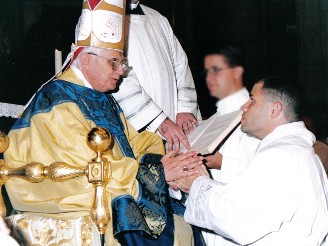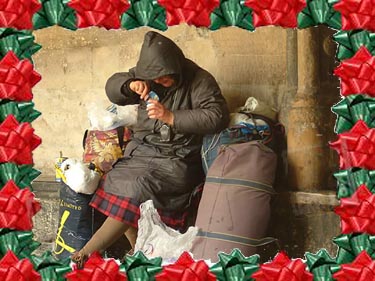God’s Christmas Gift
Christmas
Peace and blessings to everyone! I wish you all a Merry Christmas—a joyous, holy and peace-filled Christmas.
A special “Welcome Home” to children back from school, from the Service, from your homes in distant cities. Welcome back to parents, grandparents, family and friends who have over the years moved away but have come home for the holidays. Welcome also to first-time visitors. May you experience all the rich blessings of Christ’s Nativity!
Back around 1987, before I ever felt a call to be a priest—or even a Catholic or a Christian, for that matter—I lived in Middletown, New Jersey, a suburb of New York City. My family and I were in the advertising agency business and we were doing very well, so we decided to do up Christmas in a really big way. My niece, Jennifer, was about 7 at the time. I remember many shopping trips to Toys-R-Us, F.A.O. Schwartz, Kay-Bee Toys and anyplace else we could think of. We bought everything we thought this little girl would like.
Christmas eve, we played Santa and started to haul out the gifts from their hiding places. We quickly filled the space under the tree… then around the tree… then throughout the living room… then up the landing into the hallway and into the parlor… then even on the stairs. There were so many presents that you could hardly walk.
Well, the next morning, Jenn came to the top of the stairs and rubbed her eyes in awe and disbelief. With great enthusiasm, she started to tear into package after package. But I’ll tell you, a 7-year-old just doesn’t have the stamina of a true gift-a-holic. After a mere three or four hours of this—and without making even a dent in the pile of loot—the poor child was in tears. I’ll never forget her cry. “Please! No more Christmas!”
That year, I learned that the expression is absolutely true that goes: you can have too much of a good thing. Before that, I always thought that more is better.
I know that you’re probably getting a lot of neat stuff for Christmas. Maybe the living room will be a disaster after all the boxes are pulled out from under the tree and ripped open. What will you get? The latest style of Levis or Calvin Kleins? Shirts from Old Navy or Abercrombie & Fitch? Maybe underwear from Dolce & Gabbana. Or maybe you’re into Ann Taylor or Victoria’s Secret—or even Carhartt. There’s a lot of great clothes we can put on our bodies.
Some of us don’t like others to buy us clothes. My sister still razzes me for buying her a too-confining suede gaucho outfit 25 years ago. I suppose if we’re still here in another 25 years, I’ll still be getting heck!
Maybe we get stuff for the house or garden or nifty new things for the kitchen. And then there are all kinds of toys and gadgets and amazing new electronics. We buy them for one another at Christmas and for ourselves the rest of the year.
But all this stuff from our family and friends aside, what did God get us for Christmas? Oh yes. He has gifts for us, too.
For starters, he gave us the gift of life itself a long time ago. I pray that we all appreciate how very precious this gift is.
He’s also given us another great gift: the promise of salvation and eternal life with him in heaven—and Lord knows, that’s a promise we should all be grateful for every single day.
And isn’t it funny? God didn’t deliver these gifts by means of a jolly old man in a furry red suit. He didn’t buy them in the mall or online or the outlet shops at Tuscola. No, he sent them with a tiny infant.
That infant only had enough days on this earth for a brief ministry, but somehow, its impact has lasted for a very long time—more than 2000 years so far. He is God’s beloved Son who keeps coming back, Christmas after Christmas, and sometimes in the most unlikely places and in the most unlikely persons.
But why a baby? God wants us to know that salvation shouldn’t be frightening or intimidating—and that it comes with a human touch. Isn’t that amazing? Just as much as God is totally God, totally divine—he’s also completely human. As human as you or me.
We can really relate to another human being. He speaks our language. He knows how we tick, so he can understand our weaknesses and even some of the really dumb things we sometimes do. And maybe best of all, he can see past all that stuff and love us, and even like us, just the same.
Thank God, our salvation doesn’t depend on our always being good—although, of course, being good is a very good thing to be. God is willing to forgive us, forget about even our worst failings, and move forward with a clean slate. All we have to do is apologize and ask. Why, God even gave us lots of simple ways to do that—like prayer, good deeds, the mass, confession, and all the other sacraments.
The gift of salvation doesn’t come in a big box with a beautiful bow, but it’s warmer than any fleece-lined, windproof, waterproof, micro-fiber jacket. It’s better than a cuddly blanket to comfort us when we’re lonely or to share with the people we love. God especially wants that. He wants us to get along and take care of each other.
This gift doesn’t come in designer colors or different sizes, but it’s the thing that gets us out of all the messes we so easily get ourselves into. One size seems to fit all… it always works… and there are not a lot of complicated instructions. No assembly required.
And perhaps best of all, the gift of salvation is freely offered to everybody—rich or poor, white or black, smart or slow, straight or gay, saint or sinner…
Yes, we should definitely enjoy all the blessings of Christmas—the family, the friends, the gifts given and received, the wonderful food and treats, the music and decorations, the joyful atmosphere… but it’s good to focus on what this festival day is really about. We should especially remember that we don’t need to devour one another and we don’t need to stuff our stockings so full that there’s not enough to go around.
Instead, let’s all do our best to spread the word that the greatest gifts of Christmas are free for the asking. Just ask and receive. No payments, no interest, no bills next month.
Dearest friends, may our newborn King truly bless you and fill you with his peace, his joy and his love on Christmas and always.




